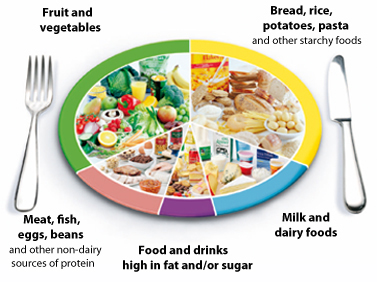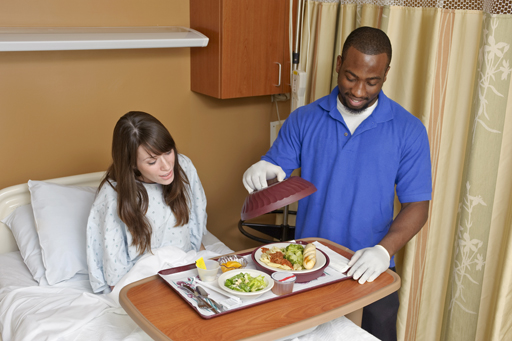2 Fluids and nutrition
According to the UK Food Standards Agency (FSA), a normal balanced diet should include about one-third fruit and vegetables, and one-third bread, rice, potatoes, pasta and other starchy foods (carbohydrates). The remaining third of the diet should be made up of about equal quantities of meat, fish, eggs and beans (sources of protein) and of milk and dairy foods, with ideally only a small amount of foods and drinks that are high in fat and/or sugar. This is illustrated in the FSA’s ῾eatwell plate᾿ (Brown, 2010).
People who are ill particularly need fluids and nutrition to help them get better, and as a healthcare assistant maintaining appropriate levels of these in accordance with patients’ care plans will form a major part of your day-to-day work. Caring for patients who find eating and drinking difficult can however pose a big challenge for healthcare staff, and recent reports have shown evidence of severe problems in this area.
Nutrition is more than calories; our diets must be balanced and contain a range of vital nutrients which are important to remember. Some medical conditions will require a diet which is high or low in some of them. These nutrients include:
- carbohydrates for energy
- protein for body repair
- fibre to help our digestion and remove waste products
- minerals for our bones, teeth, blood and nerves;
- vitamins to regulate many of the body’s systems and functions (OpenLearn, 2011).
It might seem that patients in hospital would need less food than normal, because they’re less active, and this is true for some but not all. Many people are underweight when they come for treatment or admitted to hospital and need building up, whereas other people with excess weight may be encouraged to lose some pounds, for example, if they have heart disease or arthritis. Patients may need a full diet or a light diet, high calorie or low fat, or low carbohydrate if they are diabetic, and all food requirements will form part of their care plan once an assessment has been made about their nutrition and hydration. The healthcare assistant might be required to help patients choose their meals from a menu, and in other cases make appropriate choices on their behalf. It would also be an important part of your role to observe any ‘nil by mouth’ instruction, for example, for patients going to the operating theatre.
It is essential that patients maintain a good level of fluid intake (hydration). Water is the most important aspect of our diet because we can’t manage without daily supplies, and fluid losses must be replaced quickly to avoid long-term damage, for example, to the brain and vital organs. The body only has a small reserve of water, and a lack of liquid intake (dehydration) results in weakness, headaches, tiredness and loss of concentration, followed by collapse and eventually death. Water losses through urine, from the skin, from breath and in faeces average about two litres per day, and they must be replaced (OpenLearn, 2016).
You may be aware of instances where patients did not receive enough hydration or nutrition which can result in devastating results:
- 'Dehydration contributes to the death of more than 800 hospital patients every year. Another 300 die malnourished̓' (Daily Mail, 2011 [Tip: hold Ctrl and click a link to open it in a new tab. (Hide tip)] )
- Lydia Spilner (100 years old) passed away from renal failure caused by dehydration (The Guardian, 2013).
Activity 2
(Adapted from Skills for Care (2015b) Workbook 8, Fluids and Nutrition)
Activity 3
Listen to the next audio podcast about a lady living with a visual impairment. She talks about the support she needed with eating and drinking.
Having listened to the audio podcast, write down some notes about how you would encourage a patient with a visual impairment to eat and drink.
[This audio is provided for use within the course only.]
Transcript: Support with eating and drinking
Comment
You might have said that you need to know your patient as an individual so that you’d be aware if any psychological issues are preventing them from eating (e.g. loss of dignity and independence at needing to be fed by someone else, or feeling depressed and getting no enjoyment from food), or whether the issues are practical and they physically can’t see the food (the lady speaking describes the importance of a healthcare assistant explaining what types of food are on the plate, and their positioning using a clock-face approach.) Or if she cannot see where the cutlery is you would need to hand it to her. Also she might lack the strength to lift the spoon to her mouth or simply have no appetite.
It is very important as a healthcare assistant to understand what a vital role fluids and nutrition play in patient care and recovery: wherever you work, and so you are likely to be involved in assisting patients with food and hydration each and every day.
1 Privacy and dignity


